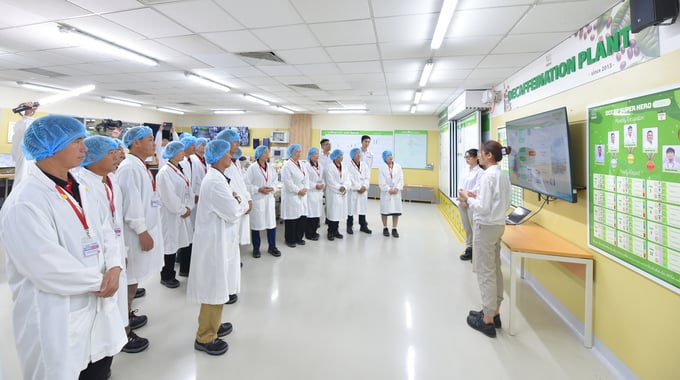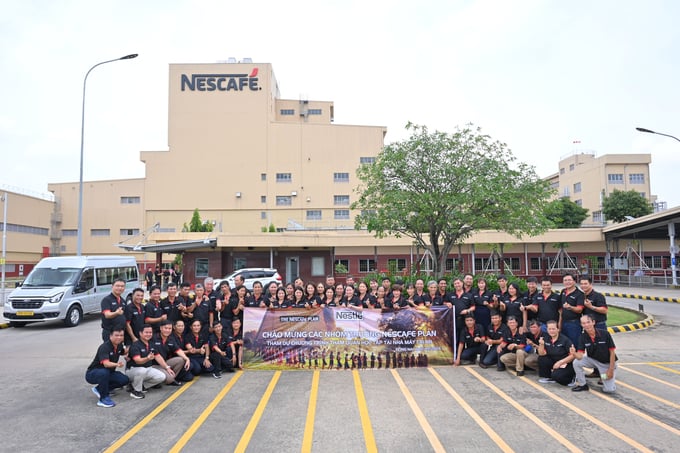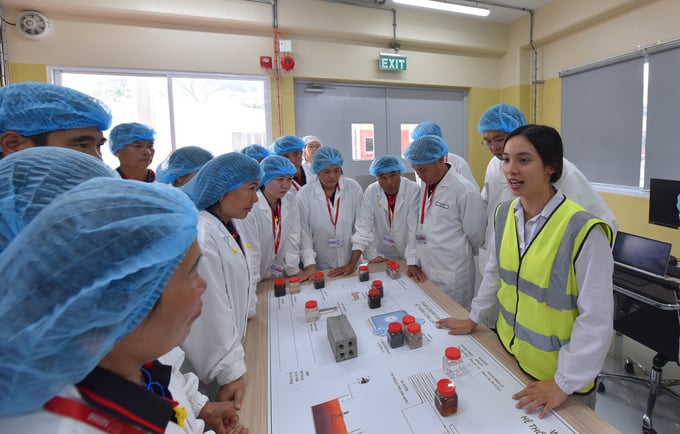May 20, 2025 | 18:39 GMT +7
May 20, 2025 | 18:39 GMT +7
Hotline: 0913.378.918
May 20, 2025 | 18:39 GMT +7
Hotline: 0913.378.918

Fifty outstanding NESCAFÉ Plan farmers attended a presentation on the decaffeination process. Photo: NVL.
With the goal of helping coffee farmers understand advanced processing activities and increase the value of Vietnamese coffee beans, Nestle Vietnam Co., Ltd. organized a learning and observation tour for the fifty outstanding farmers participating in the NESCAFÉ Plan program.
The tour provided farmers with an opportunity to explore coffee processing technologies, sample various coffee products, and engage with on-duty staffs at a modern coffee processing plant.
Pham Phu Ngoc, NESCAFÉ Plan Program Manager at Nestle Vietnam, commented: “This is the first tour we organized for farmers who have been closely involved with the NESCAFÉ Plan for over thirteen years. This is also an opportunity for NESCAFÉ to express our gratitude and show them how their dedication and contributions have played a crucial role in the success of the NESCAFÉ Plan and the sustainable development of the Vietnamese coffee industry as a whole.”
The tour provided farmers with a deeper understanding of the journey of Vietnamese coffee, from raw materials and processing to the production of high-quality products that are currently present in over 30 global markets, including those with strict quality standards such as Europe, Japan, South Korea, and the United States.
The event also reinforced Nestle's commitment to supporting farmers in transitioning to sustainable farming models, improving livelihoods, and enhancing the value of Vietnamese coffee in both domestic and international markets.
“We hope that after this tour, farmers will feel even more proud of their journey and continue to spread positive messages about green agriculture, further reinforcing Vietnam's position as a leading producer and exporter of high-quality coffee on the global stage,” emphasized Program Manager Ngoc.

Fifty outstanding farmers from the NESCAFÉ Plan program had a memorable and special visit to Nestlé Tri An Factory in Dong Nai Province. Photo: NVL.
Mai Thi Nhung, a farmer who has participated in the NESCAFÉ Plan program since 2015, was selected for the factory tour. She shared that it was her first time visiting Nestlé's modern coffee processing facility. She also expressed her pride in seeing Nestlé transform the coffee beans she cultivated into a high-quality and globally available product.
"As a Farmer Group Leader for the NESCAFÉ Plan program, I will share this story with other members during our upcoming group activities to help them understand their role in providing high-quality coffee beans by applying the sustainable farming practices taught by Nestlé’s agricultural support team," Nhung added.
Nestlé Vietnam has implemented the NESCAFÉ Plan, a global initiative by Nestlé Group, in the Central Highlands since 2011. Accordingly, Nestlé Vietnam deployed the program in collaboration with the Ministry of Agriculture and Rural Development, the Western Highlands Agriculture and Forestry Science Institute, and local agricultural extension centers to support coffee farmers in practicing regenerative agriculture.

NESCAFÉ Plan farmers listening to a presentation by an engineer at the Nestlé Tri An Factory. Photo: NVL.
To date, the NESCAFÉ Plan has conducted over 355,000 training sessions on sustainable coffee farming for local households, supporting an average of 21,000 farmers annually between 2011 and 2023. The program has distributed more than 74 million high-yield, pest- and drought-resistant coffee seeds, and rejuvenated over 74,000 hectares of aged coffee farms.
By adopting regenerative agriculture practices in the coffee production process, the program has helped farmers save up to 40% in water usage, reduce chemical fertilizers and pesticides by 20%, and increase incomes by 30 to 100%.
The program has also established 274 farmer groups, with over 30% led by women. These women receive specialized training and, subsequently, share their knowledge and inspire local farming communities to practice sustainable agriculture.
In May 2024, Nestlé released its second NESCAFÉ Plan 2030 Progress Report. The report highlighted the increased adoption of regenerative farming practices, which improved productivity, reduced greenhouse gas emissions, and supported Nestlé’s efforts to foster multi-stakeholder cooperation for the sustainable development of the coffee industry. Consequently, these efforts aim to improve farmers' livelihoods and promote a green, low-carbon agricultural future.
The global NESCAFÉ Plan program, launched by Nestlé Group in 2010, has been implemented in key coffee-growing regions worldwide with the aim of delivering sustainable value to farmers.
Recognizing the importance of mutual learning, the NESCAFÉ Plan launched an online platform, Agrinest. This platform aims to connect farmers worldwide, enabling them to share knowledge and strengthen collaboration.
Nestlé also made important contributions to the “Regenerative Agriculture for Low -Carbon and Resilient Coffee Farms – A Practical Guidebook”.
Translated by Nguyen Hai Long

(VAN) Japan's grant aid project contributes to capacity building, promoting organic agricultural production, and fostering sustainable community development in Dong Thap province.

(VAN) For years, the CRISPR-Cas9 genome technology has been reshaping genetic engineering, a precision tool to transform everything from agriculture to medicine.

(VAN) Vietnam aims to become a 'leader' in the region in the capacity and managing effectively soil health and crop nutrition.
![Reducing emissions from rice fields: [Part 1] Farming clean rice together](https://t.ex-cdn.com/nongnghiepmoitruong.vn/608w/files/news/2025/05/05/z6509661417740_a647202949c539012a959e841c03e1d3-nongnghiep-143611.jpg)
(VAN) Growing clean rice helps reduce environmental pollution while increasing income, allowing farmers to feel secure in production and remain committed to their fields for the long term.
/2025/05/19/5136-1-144800_230.jpg)
(VAN) The Nghe An Provincial People's Committee has just approved the list of beneficiaries eligible for revenue from the Emission Reductions Payment Agreement (ERPA) in the North Central region for the year 2025.

(VAN) 14 out of 35 domesticated elephants in Dak Lak province have had their living conditions improved, with 11 of them currently participating in the non-riding elephant tourism model.

(VAN) Muong Nhe Nature Reserve hopes that being upgraded to a national park will lay the foundation for forest protection efforts to be carried out in a systematic, modern, and sustainable manner.